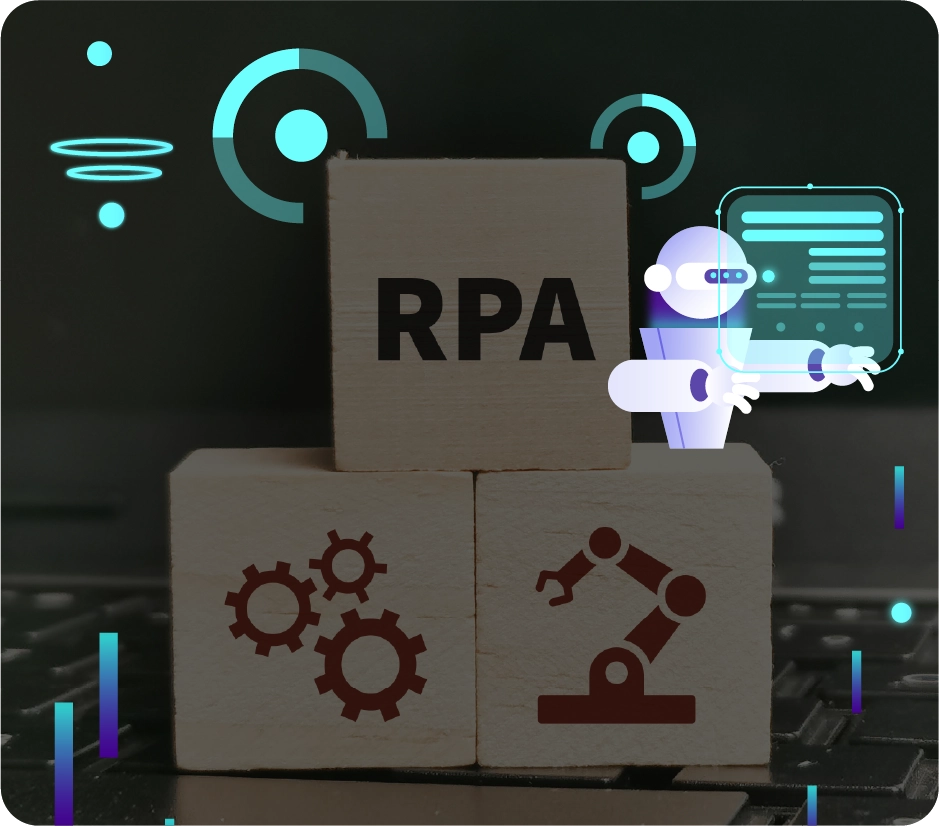Want to enhance your business performance with RPA?
Our RPA Services
Our team of RPA experts conducts in-depth analyses to identify the best automation opportunities for your business. We deliver customized solutions tailored to your specific needs.
RPA Consulting
Bot Implementation
RPA Maintenance
RPA Managed Services
What is Robotic Process Automation?
Robotic Process Automation (RPA) technology automates rule-based, repetitive tasks across business processes. RPA software robots mimic human actions by interacting with digital systems. This eliminates the need for manual input. This technology reduces time delays and operational overheads.
Our RPA solutions assist with process discovery, ROI projection, and managed RPA services. It ensures that your business operations are both productive and efficient. Our deep domain expertise and partnerships with leading RPA providers help you achieve new levels of operational efficiency.
Our Achievements in Numbers
Our Sucess Stories
Why Choose Us for Robotic Process Automation Services?
Selecting the right partner for RPA implementation is crucial for success. Here is why our robotic process automation services stand out:
Expertise and Experience
With extensive experience in RPA implementations across various industries, we have deep knowledge of the technology and its applications.
Customized Solutions
We understand that one size does not fit all. We provide custom RPA solutions that align with each client's unique needs.
Comprehensive Support
From initial consultations to ongoing maintenance, we offer full-spectrum support to ensure your success.
Proven ROI
Our track record shows ROI for clients, driving efficiency, reducing costs, and enhancing business performance.
Robust Security Measures
We focus on data security, implementing robust measures to protect your information, and ensuring compliance with industry standards.
Client-Centric Approach
We focus on understanding your business needs and challenges and crafting RPA solutions that align with your goals.
Continuous Improvement
As RPA evolves, we optimize and enhance your RPA solutions to keep you ahead of the curve.
Certificates That Symbolize Excellence
Certificates highlighting our excellence in providing innovative custom software development, reliable cloud computing, and top-quality technology solutions.
Explore Our Achievements Microsoft Gold Partner
Microsoft Gold Partner Microsoft Power BI Partner
Microsoft Power BI Partner Clutch Certificate for Top Mobile App Developers
Clutch Certificate for Top Mobile App Developers Nasscom Certified Company
Nasscom Certified Company Top Rated on Glassdoor
Top Rated on GlassdoorIndustries that Benefit from RPA Services
- Financial Institutions
The financial sector stands to gain from the implementation of Robotic Process Automation (RPA). Due to the sheer volume of routine tasks, it manages daily. RPA automates these repetitive processes, freeing up valuable human resources to focus on more strategic and value-driven activities. RPA can streamline credit management, customer onboarding, claims processing, regulatory compliance reporting, and contract administration.
- RPA for the Healthcare Sector
In the healthcare industry, operations are often burdened by many manual tasks that RPA can handle. Automating these processes enables healthcare professionals to dedicate more time and attention to patient care. RPA can be particularly beneficial in patient enrollment and scheduling, insurance eligibility qualification, clinical documentation, and billing and claims processing.
- RPA for the Real Estate Industry
The real estate industry also benefits from RPA by streamlining its repetitive tasks. Thereby increasing efficiency and reducing manual workload. RPA can optimize processes such as vendor and customer setup, deal sourcing research, entity and property setup, and budgeting and forecasting. RPA solution allows real estate professionals to focus on more critical aspects of their operations.
Business Benefits of RPA
Boost in Productivity
Robotic process automation services automate routine tasks, freeing employees to concentrate on more valuable and creative work. According to Salesforce, 79% of workers have reported increased productivity as a significant benefit of automation.
Cost Savings
Implementing robotic process automation solutions can reduce operational costs. A Deloitte survey revealed that 66% of Global Business Services (GBS) organizations achieved at least a 10% cost reduction thanks to automation. In financial services, RPA can cut costs by up to 60%.
Time Efficiency
Automation tools save workers an average of 3.6 hours each week. RPA solutions also speed up processes like insurance claims, completing them 75% faster than manual processing.
Higher Accuracy
RPA minimizes human errors, improving business operations' quality and precision. Deloitte reports that 90% of companies experienced improved accuracy after adopting RPA services.
Better Compliance
RPA solutions help organizations adhere to regulatory requirements more effectively. In a Deloitte survey, 92% of respondents noted enhanced compliance after implementing RPA.
Scalability
RPA enables companies to expand operations without proportional cost increases. Most organizations see a return on their RPA investments within 12 months.
Increased Job Satisfaction
Automating repetitive tasks, RPA solutions allow employees to focus on more meaningful work, leading to higher job satisfaction, better morale, and reduced employee turnover.
Automate and focus only on business growth with RPA.
Connect with us now and learn how we can help you implement RPA. No obligation until you're sure we’re the right fit.
RPA Implementation Roadmap
Analysis
Assessing business processes and designing a long-term automation roadmap.
Technical Design
Creating a technical blueprint, modeling exceptional cases, and delivering technical documentation.
Implementation
Executing the automation plan and providing training.
Acceptance Testing
Testing RPA in real-world workflows, gathering feedback, and finding improvement areas.
Delivery
Deploying the solution in your environment and training employees.
Support & Adjustment
Offering post-launch hyper care support, monitoring performance, and updating configurations as needed.
Blogs and Resources
FAQ
01What is Robotic Process Automation (RPA)?
Robotic Process Automation (RPA) is software designed to handle repetitive tasks across various applications. These software robots mimic human actions, performing tasks quickly and accurately, even at high volumes. RPA helps businesses streamline processes by automating simple, rule-based activities.
02What is RPA Used For?
RPA is used to automate tasks that are repetitive and time-consuming, freeing up human workers. It’s commonly applied in data entry, system logins, data validation, and generating reports. RPA can also handle approvals and manage workflows, making business operations more efficient.
03What Are the Different Types of RPA?
There are three main types of RPA. Traditional RPA focuses on automating routine tasks with predefined rules. Cognitive RPA combines automation with AI to handle more complex tasks, such as reading and understanding text. Integrated RPA merges with other technologies like process mining to uncover new automation opportunities.
04What Is RPA Managed Services?
RPA managed services involve outsourcing the management of RPA systems to a specialized provider. This service includes deploying, configuring, and supporting your RPA environment, ensuring it uses smoothly without any hiccups.
05What Are Some Examples of RPA?
RPA can be used in various ways, such as automating data extraction from invoices and updating accounting systems. It also helps with onboarding new employees by automating form completion and data entry. In industries like insurance, RPA processes claims quickly by reviewing documents and updating records.
06What Do RPA Solutions Include?
RPA solutions typically include a platform for building and managing bots, along with intelligent automation features like AI and OCR. They also offer tools for discovering automation opportunities and monitoring process performance, ensuring everything runs efficiently.
